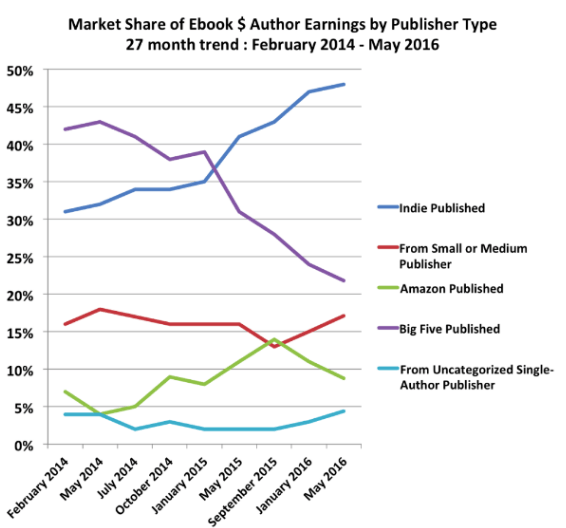What We’re Reading
Here are a few good articles the Collaborative Fund team came across this week.
Going solo
Self-published authors have taken huge market share away from big book publishers:

Idle
Lyft co-founder John Zimmer writes an incredible piece on the future of driving:
Let’s start by looking into how much money we spend on car ownership and how often we actually use our cars. It may shock you, but Americans spend more than $2 trillion every year on car ownership — more money than we spend on food. What’s even more staggering is that for all the money we spend on them, the 250 million cars in America are only occupied 4% of the time. That’s the equivalent of 240 million of the 250 million cars being parked at all times. For the most part, your car isn’t actually a driving machine at all. It’s a parking machine.
(Lyft is a Collaborative Fund portfolio company.)
Wisdom
Tren Griffin cites Howard Marks’s conditions necessary for big investment returns:
To boil it all down to just one sentence, I’d say the necessary condition for the existence of bargains is that perception has to be considerably worse than reality. That means the best opportunities are usually found among things most others won’t do. After all, if everyone feels good about something and is glad to join in, it won’t be bargain-priced. A hugely profitable investment that doesn’t begin with discomfort is usually an oxymoron.
Rationality
Tom Goodwin throws cold water on the idea that every company is now a tech company:
Many companies are not tech companies, they are brands. GoPro, Chipotle, Sonos, Blue Bottle Coffee, Casper and Shake Shack are good companies with great products, but they all exist in marketplaces where existing benchmarks are probably helpful. Chipotle or Shake Shack is more McDonald’s than it is Snapchat; WeWork is likely more like Regus than Facebook; Blue Bottle Coffee needs to do a Starbucks expansion plan, not a YouTube roll out.
Gullibility
Shane Parrish shares Daniel Kahneman’s insight into memory and risk:
People tend to assess the relative importance of issues by the ease with which they are retrieved from memory—and this is largely determined by the extent of coverage in the media. Frequently mentioned topics populate the mind even as others slip away from awareness.
Safety
Tesla added a feature to reduce child and pet deaths from overheated cars:
Tesla’s temperature-control function will automatically keep the temperature below 105˚ Fahrenheit – 40˚ centigrade – inside the car by automatically opening vents or turning on the air conditioner as needed, Musk tweeted. The feature will remain on for up to 12 hours after the driver exits the vehicle.
Information
Tyler Cowen has an interesting take on why the media is so despised by so many:
No matter what the media tells you their job is, the feature of media that actually draws viewer interest is how media stories either raise or lower particular individuals in status … In essence, (some) media is insulting your own personal status rankings all the time. You might even say the media is insulting you. Indeed that is why other people enjoy those media sources, because they take pleasure in your status, and the status of your allies, being lowered. It’s like they get to throw a media pie in your face.
Have a great weekend.